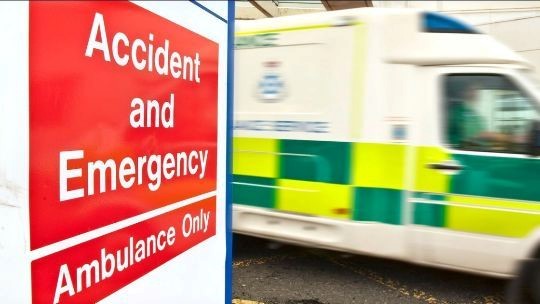
As we continue to strive for the best possible care for everyone across NHS Greater Glasgow and Clyde, it is crucial to ensure that our Accident & Emergency (A&E) departments are reserved for those who truly need urgent medical attention.
Similar to elsewhere across the country, NHSGGC’s emergency departments continue to see a high proportion of patients who do not need to be at A&E and that an alternative service is more suitable to their needs.
The highest level of attendances at our A&E departments are members of the public who self-present, rather than being directed by a medical professional.
Accessing the right care in the right place, not only speeds up process of you being treated, but it helps ensure our doctors and nurses can treat the most serious of cases.
So, what are some of the most common conditions across our A&E departments that can be treated elsewhere? We breakdown conditions that do not need be treated at A&E.
Sprains & Strains
Why not A&E?
Most of the time, A&E departments are not needed for this type of condition, and if you do attend at our A&E departments, you may be directed to one of our Minor Injury Units where you will be treated quickly and efficiently.
Our dedicated minor injury units (MIUs) are the best places to be if you have a sprain or strain.
What to do?
If you have a minor injury, such as a cut that need stitches, a broken bone, a sprains or minor burn, please call NHS 24 on 111 and ask for our Minor Injuries Unit (MIU) service.
NHS 24 will give you advice on what to do next. This may include a video or telephone consultation at our virtual A&E service, and if appropriate a face-to-face at one of our MIUs so that you don’t need to hang around at a busy A&E department.
If you are referred to the MIU, your assessment will be carried out by a team of highly experienced staff, led by Emergency Nurse Practitioners. They will give you quick access to health information, advice and treatment. Treatment includes being able to arrange x-rays if required, apply plasters or splints and stitch and dress wounds.
Urinary Tract Infections (UTIs)
Why not A&E?
A common reason that people attend the emergency departments is a suspected urinary tract infection (UTI).
Last year, NHSGGC’s emergency departments saw around 3,800 patients attend with UTIs, with only around 1,200 required to be admitted.
What to do ?
Pharmacies across NHS Greater Glasgow and Clyde play a vital role in helping patients manage UTI’s and if you are a female aged 16-65, your local pharmacist may be able to help.
Our local highly skilled pharmacy clinician can carry out an assessment and may provide you with the appropriate treatment such as pain relief or an antibiotic.
This means that you do not need to contact attend at emergency department, but access the same quality of care in your local community
Colds and Common Illnesses
Why not A&E?
Conditions such as common colds, sore throats and coughs are often uncomfortable but do not need treated at A&E.
Our accident and emergency departments are best equipped to deal with life threatening situations and common illnesses can often be treated elsewhere.
What to do?
Most common illnesses can be treated at home with a range of self-care and rest often the best course of action.
For reliable and concise advice around common illnesses, please visit NHS Inform for treatments specific to your needs.
Additionally, and similar to UTI’s, your local pharmacist will be able to assist in assessing your requirements that do not require physical A&E attendance.
For more information on ensuring you access the right care at the right place, please visit Symptoms and self-help | NHS inform or Right Care, Right Place – NHSGGC.
